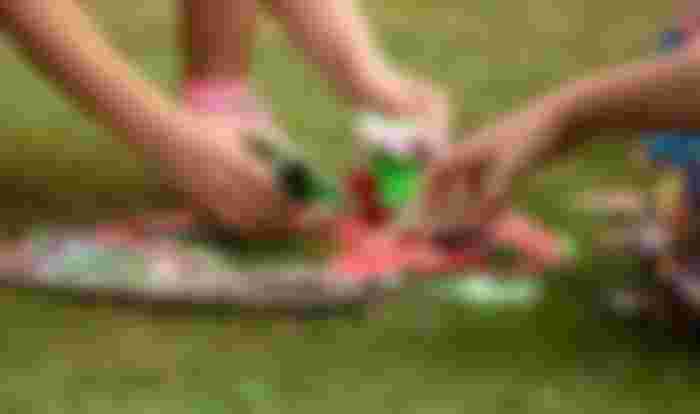Teaching socialization skills to children
This past week, my son came home with a disturbing story. A little boy in his class had gotten into a fight with one of his classmates, and as words turned to fisticuffs, the little boy searched for a weapon. The closest thing he could find was a sharpened pencil. And because I don't want to share much gory stuff on this page because I do not know your triggers as my readers, I'll simply say that the other little boy had a bleeding head at the end of the ordeal. And then I'll sum this story up by saying that the boys in question are between eight and nine years old.

When my son sat wide-eyed and told me this story in the car, my heart went out to the victim, and I was extremely concerned for all the little children in the class. Violence is never the right answer, and it is inexcusable at all ages.
And I know that maybe some of you may pish posh and say, oh, boys will be boys, however when a child at such a young age displays these alarming tendencies to violence so as to use a pencil as a weapon, then I think there is need for psychological intervention, in the very least.
Beyond this isolated incident though, I think as parents, we need to take into account the critical importance of our role as guides in the lives of our children, and recognize and embrace our responsibility to teach them the right socialization skills so that they can grow with these values and practices into peaceful adults who practice critical thinking, seek peaceful solutions, and continue to strive to ensure in this very small space we must share on this Earth that we all get along.
Have you ever read Mark Twain's Tom Sawyer? If you did, you'd remember the fight in the first chapter where Tom is set to do chores he's unhappy about because he'd much rather be out and about playing and then he sees a strange, well-dressed boy approaching and having a lark. Tom's envious and so the boys argue and Tom draws a line in the sand and threatens the boy, "I dare you to step over that, and I'll lick you till you can't stand up."
The boy, of course, crosses over the line and says, "Let's see you do it." A fight ensues.
I think the suggestion behind this story is that boys fight and it's normal, almost a rite of passage. It's important to note though that this story by Mark Twain was written in the year 1876, more than 100 years ago, and the rules of social engagement have changed significantly since then. And we have seen all too often the devastating outcome of excusing deviant behavior by saying indifferent things like boys will be boys.
The following are some simple socialization skills we should all teach our children:
Listening
Cooperating
Sharing
Respecting personal space and boundaries
Following directions
Patience
Listening
Listening is a skill many of us take for granted. Listening is more than simply hearing what someone says, it's a discipline that requires us to also analyze and understand the things we hear. If we take the time to listen carefully to others, we can understand different points of view better and avoid misunderstandings and conflict.
Cooperation
We do not live in isolation. We must coexist. To achieve success, we must also be able to work together.

While much is said of competition, I actually think cooperation is more powerful because when you cooperate with others, there is no room for animosity and you're all trying to help each other.
Sharing
Sharing, or as they say in my country, 'learning to give a little', teaches us to compromise.
I've heard little children say, "sharing is caring", and this is very true because at the root of it all, genuine sharing with another requires a level of empathy as well.
Respecting personal space and boundaries
Setting personal space is about keeping a distance between oneself and others.
If you respect someone's personal space, for example, you'd try to pay attention to your surroundings and won't be walking into others, you won't step on someone else's bag or attempt to mess with someone else's property, because you would recognize that these aggressive acts can lead to conflicts. By keeping a respectful distance, you allow for room for healthier communication to grow.
Personal space and boundaries is not just physical. It might also be that someone does not want to speak, wants to be left alone for a bit, and respecting that request would mean not imposing on that person's boundaries as well.
Following directions
As students, and in life, there will always be situations where we must follow instructions or directions of some sort. Following directions requires us to listen, it may require us to cooperate, it helps us to show respect for authority and for others, and is a key component in showing discipline in a classroom setting and in life.
Patience
Sometimes situations may occur where one may feel annoyed, but it is important not to be hasty. Patience helps you to curb and control anger and stress. You are calmer and better able to respond to situations with wisdom.

All of the above are tools that can help our children to strengthen their critical thinking skills and contribute to their overall emotional intelligence.
As adults, whether we are parents, teachers, older siblings or even aunts and uncles, it is important that we invest time and effort into teaching these foundational skills to children, not just by our words, but most importantly by our actions, demonstrating to them healthier ways to address and respond to situations.
This, I think, is a shared a responsibility that we cannot simply take for granted and leave for the other person. And I say this simply because ultimately, we all share one space and if we allow weed-like behavior to grow, pretty soon weeds will be stifling all of us.
With all of that said, I hope that appropriate action is taken and that the child in my son's class is assessed, given counselling and the proper anger management training so that he can return to the classroom with a healthier outlook and so that greater damage can be averted in the future.
Thanks for your attention, my friends. I truly appreciate the time you have spent with me.



Impeccable piece. Perfectly hammering important part of 'child raising' I couldn't agree more with this.